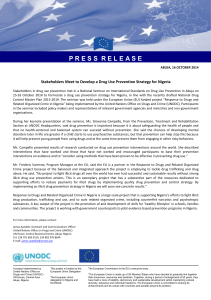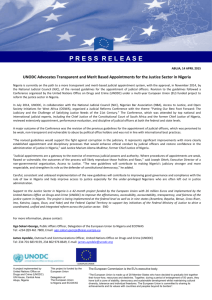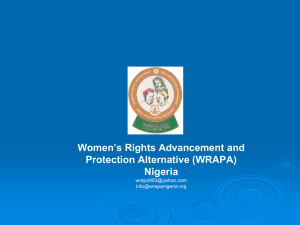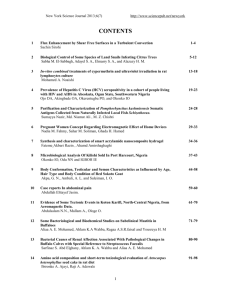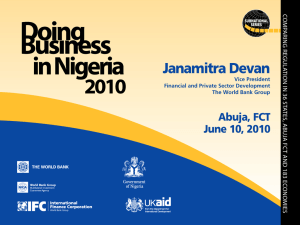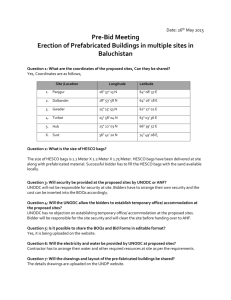EU-UNODC Support Enhances Justice Sector Reforms in Benue State
advertisement
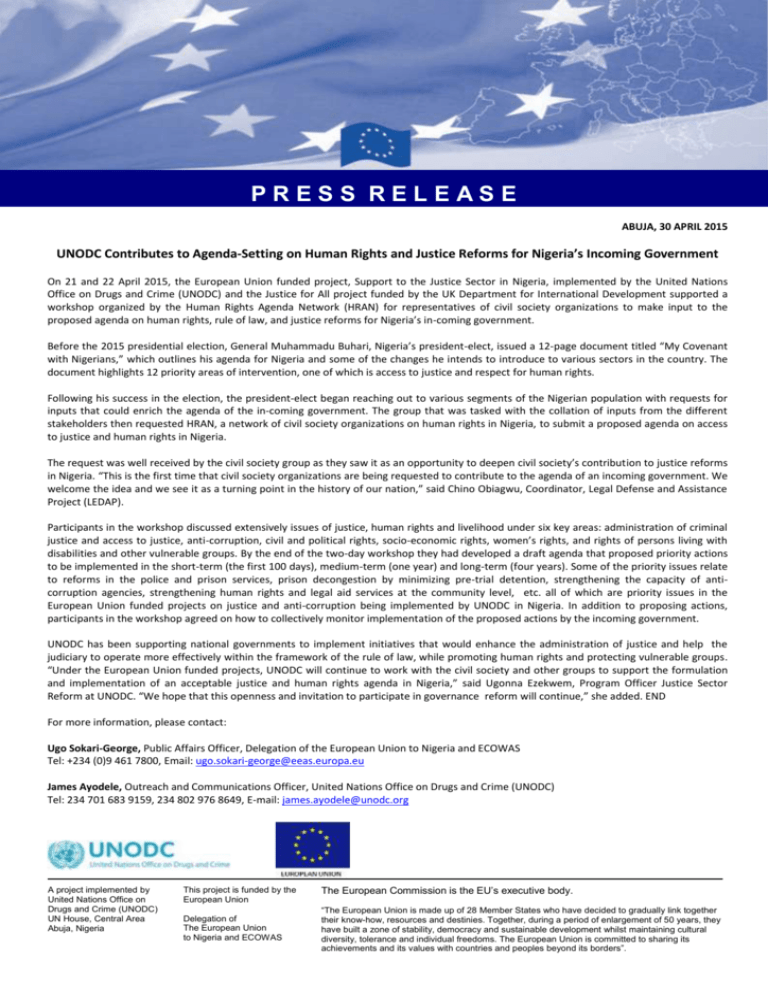
ke PRESS RELEASE ABUJA, 30 APRIL 2015 UNODC Contributes to Agenda-Setting on Human Rights and Justice Reforms for Nigeria’s Incoming Government On 21 and 22 April 2015, the European Union funded project, Support to the Justice Sector in Nigeria, implemented by the United Nations Office on Drugs and Crime (UNODC) and the Justice for All project funded by the UK Department for International Development supported a workshop organized by the Human Rights Agenda Network (HRAN) for representatives of civil society organizations to make input to the proposed agenda on human rights, rule of law, and justice reforms for Nigeria’s in-coming government. Before the 2015 presidential election, General Muhammadu Buhari, Nigeria’s president-elect, issued a 12-page document titled “My Covenant with Nigerians,” which outlines his agenda for Nigeria and some of the changes he intends to introduce to various sectors in the country. The document highlights 12 priority areas of intervention, one of which is access to justice and respect for human rights. Following his success in the election, the president-elect began reaching out to various segments of the Nigerian population with requests for inputs that could enrich the agenda of the in-coming government. The group that was tasked with the collation of inputs from the different stakeholders then requested HRAN, a network of civil society organizations on human rights in Nigeria, to submit a proposed agenda on access to justice and human rights in Nigeria. The request was well received by the civil society group as they saw it as an opportunity to deepen civil society’s contribution to justice reforms in Nigeria. “This is the first time that civil society organizations are being requested to contribute to the agenda of an incoming government. We welcome the idea and we see it as a turning point in the history of our nation,” said Chino Obiagwu, Coordinator, Legal Defense and Assistance Project (LEDAP). Participants in the workshop discussed extensively issues of justice, human rights and livelihood under six key areas: administration of criminal justice and access to justice, anti-corruption, civil and political rights, socio-economic rights, women’s rights, and rights of persons living with disabilities and other vulnerable groups. By the end of the two-day workshop they had developed a draft agenda that proposed priority actions to be implemented in the short-term (the first 100 days), medium-term (one year) and long-term (four years). Some of the priority issues relate to reforms in the police and prison services, prison decongestion by minimizing pre-trial detention, strengthening the capacity of anticorruption agencies, strengthening human rights and legal aid services at the community level, etc. all of which are priority issues in the European Union funded projects on justice and anti-corruption being implemented by UNODC in Nigeria. In addition to proposing actions, participants in the workshop agreed on how to collectively monitor implementation of the proposed actions by the incoming government. UNODC has been supporting national governments to implement initiatives that would enhance the administration of justice and help the judiciary to operate more effectively within the framework of the rule of law, while promoting human rights and protecting vulnerable groups. “Under the European Union funded projects, UNODC will continue to work with the civil society and other groups to support the formulation and implementation of an acceptable justice and human rights agenda in Nigeria,” said Ugonna Ezekwem, Program Officer Justice Sector Reform at UNODC. “We hope that this openness and invitation to participate in governance reform will continue,” she added. END For more information, please contact: Ugo Sokari-George, Public Affairs Officer, Delegation of the European Union to Nigeria and ECOWAS Tel: +234 (0)9 461 7800, Email: ugo.sokari-george@eeas.europa.eu James Ayodele, Outreach and Communications Officer, United Nations Office on Drugs and Crime (UNODC) Tel: 234 701 683 9159, 234 802 976 8649, E-mail: james.ayodele@unodc.org A project implemented by United Nations Office on Drugs and Crime (UNODC) UN House, Central Area Abuja, Nigeria This project is funded by the European Union Delegation of The European Union to Nigeria and ECOWAS The European Commission is the EU’s executive body. “The European Union is made up of 28 Member States who have decided to gradually link together their know-how, resources and destinies. Together, during a period of enlargement of 50 years, they have built a zone of stability, democracy and sustainable development whilst maintaining cultural diversity, tolerance and individual freedoms. The European Union is committed to sharing its achievements and its values with countries and peoples beyond its borders”.
